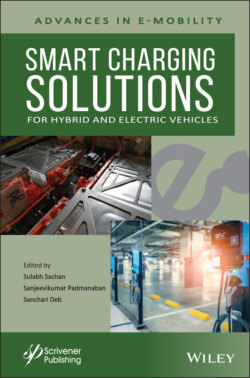Читать книгу Smart Charging Solutions for Hybrid and Electric Vehicles - Группа авторов - Страница 40
1.7.2 Decentralized
ОглавлениеDecentralized control, contrary to centralized, has distributed control and optimization modules. Charging of EVs takes place spatially in a distributed manner. Hence, the planning of decentralized control in smart charging systems is considered to be safe and reliable. In decentralized control, decision making takes place locally, where the EV charging takes place. The requirement of extensive and reliable communication systems, large and complete optimization, and the risk of damage due to a controller’s incorrect decision is readily reduced [74, 77]. The only challenge is performing load management. The data exchange between the utility grid and EV users still demands communication systems. The schematic of decentralized control is shown in Figure 1.6. Each entity has a local level controller and aggregator that are connected to a central controller. The distribution of tasks assigned to each local controller reduces the burden of the central controller to a large extent as compared to the centralized controller scheme.
Figure 1.6 Schematic of decentralized controller in smart charging architecture.
The simplicity in the implementation of the decentralized controller is leading to an increase in demand. Further, the coherency, like EV operation (spatially distributed), reduces deployment complexity. Further, decentralized control architectures are seemingly practical and scalable, considering their computational complexity [78].
Table 1.3 briefly presents the difference between the control architectures: centralized and decentralized. Based on the merits and demerits, the required architecture can be selected for the design of smart charging systems.
